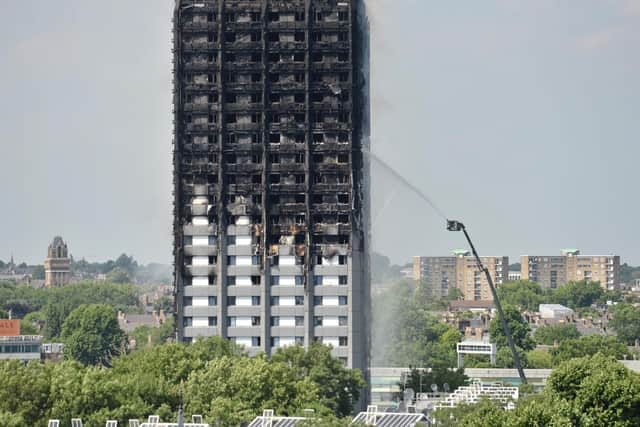Homeowners are the losers in this grim game of pass the parcel - David Alexander


Rather than huddle in the kitchen and indulge in alcohol-fuelled debates over property prices climate change or Brexit, adults would play games such as “pass the parcel” in which contestants passed around a package to the accompaniment of a piano until there were only two players left, the loser being the one holding the parcel when the music finally stopped.
Sadly, a more serious version of pass the parcel is currently being played out in the housing sector in the form of the controversy over inadequate fire cladding in high-rise buildings and, in particular, who should pay for making them safe.
Advertisement
Hide AdAdvertisement
Hide AdIn the follow up to the Grenfell Tower disaster, it was discovered that this was not the only high-rise building that had inadequate fire cladding built into it, resulting in huge economic consequences for homeowners in affected buildings


The consequences have been twofold. Firstly owners have found themselves unable to sell because lenders will not advance mortgages when a flat is part of a building deemed a potential fire risk. Secondly, whether hoping to move or not, owners have found themselves faced with huge increases in insurance premiums. One of those affected is the country’s best-known petrol-head, Jeremy Clarkson, who recently revealed that the annual cost of buildings insurance on the six-storey building in London, in which he has a flat, will be going up from £8,000 to £60,000 per annum. Some might say the enormously successful Clarkson can afford it – but that’s hardly the point is it?
Other owners have been told their homes will be uninsurable unless fire wardens are employed to provide 24-hour cover in their respective buildings.
To help alleviate the situation a Building Safety Fund, said to be worth £1 billion, was instituted by the Westminster government last July to provide homeowners with the cost of fitting appropriate cladding. There have been complaints about how it operates, with just ten per cent of applications for funding authorised by December. But at least it’s better than nothing, unlike in Scotland, where Holyrood has not followed suit, leaving affected homeowners in an even more precarious position than their counterparts south of the Border. Maybe this is down to the fact that the extent problem, on both an actual and percentage basis, is substantially smaller in Scotland; but to any homeowner involved the problem is 100 per cent.
The big scandal, however, is that rather than focusing entirely on getting the issue fixed, on either side of the Border, too much emphasis is currently being placed on who to pin the blame – hence the dark parody of the game of pass the parcel.
So who should be ultimately held responsible? Is it companies who built the properties or manufacturers who provided the cladding? Or perhaps those conveyancing lawyers charged with searching for problematic issues, surveyors who carried out surveys for mortgage approval, or perhaps fire safety officers who gave final clearance? Do all of them share some responsibility or none at all?
While I am unable to answer such a question what I can say, without a shadow of doubt, is that the one wholly-innocent party is each and every flat-dweller who bought their properties in good faith and are now being penalised through no fault of their own.
The absolute priority must be to get the technical issued fixed, which means the Scottish Government initiating a fund similar to England and thus bring hopes of an end to the ongoing nightmare those flat-owners are experiencing. If, at some later stage, the Government believes there is a case for trying to retrieve its costs from other parties then I’m sure it has sufficient in-house legal brains to pursue the matter.
David Alexander is managing director of DJ Alexander
Comments
Want to join the conversation? Please or to comment on this article.